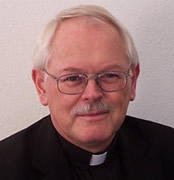
Words give us meaning. We can’t make or remake reality, but the words we choose to name our reality can lift us out of the humdrum of everyday experience.
Unfortunately, today many of the words we need to give us proper meaning no longer have much power to do that. We’re like D. H. Lawrence’s Lady Chatterley. Of her world, Lawrence writes: “All the great words were canceled for her generation. Love, joy, happiness, home, mother, father, husband, all these great dynamic words were half dead now.” That’s true too for us. More and more, the words we need to give us meaning are anemic so that deep things aren’t deep anymore. Why?
The meaning we give to things depends upon the words with which we surround them. For example, suppose you suffer from chronic backache. Your doctor can tell you that you have arthritis, a biological way of explaining your pain, and you feel better because a symptom suffers less when it knows where it belongs. However, you can see a psychologist about the same symptom and she can tell you that your pain is more than a medical condition: “You’re in mid-life crisis,” she says. And it’s consoling to know that you suffer from more than the simple creaking of age. But this can go deeper. Talking to a spiritual director, you are told that this pain is your cross to carry, your Gethsemane, your dark night of the soul, your exile to Babylon, your desert experience. Ordinary pain now becomes something with a religious meaning and significance. What something means depends upon the words we use to describe it.
The same holds true for love. What does it mean to “fall in love”? That you have “great chemistry” with someone? That you have found a “soulmate”? That last interpretation doesn’t exclude “great chemistry”, but it adds the rich dimension of soul. A deeper set of words frames your experience against a much wider horizon and that is the secret to deeper meaning.
In his book, The Closing of the American Mind, Allan Bloom gives us this example. An admirer of Plato, Bloom shares how Plato tells of his students sitting around and sharing about the meaning of their “immortal longings”. Bloom shares how his own students are prone to sit around and share about “being horny”. Such is the difference in meaning! Plato’s words for desire are half-dead now in our culture and the words we use to replace them often lack depth.
When we surround our everyday experiences with deeper words, these experiences – love, joy, sex, pain, happiness, marriage, being a father, being a mother, being a husband, being a wife, making coffee, drinking it, doing our ordinary chores – will contain something of the timeless, the eternal. Meaning and happiness are less about where we are living and what we are doing than about how we view and name where we are living and what we are doing. An experience is only sublime when it’s given its proper name.
There’s a famous story of a journalist interviewing two workers at a construction site where a new church was being built. She asked the first: “What do you do for a living?” His reply: “I’m a bricklayer” She asked his co-worker: “What do you do for a living?” He replied: “I’m building a cathedral!” Perspective changes everything, and it comes from how we understand and name what we’re experiencing.
Canadian poet, J.S. Porter, once wrote: “When you take away the sky, the earth wilts!” He’s right. When we don’t surround our ordinary activities with the proper words and symbols we soon lose all enchantment and our experiences become precisely half-dead. We need a wide vision, high symbols, and the right words to turn our ordinary, seemingly mundane, lives into the stuff of poetry and romance.
Rainer Maria Rilke once received a letter from a young man who complained that it was difficult for him to become a poet because he lived in a small town where life was too domestic, too parochial, and too small-time to provide inspiration for poetry. Rilke’s answer was something to this effect: If your daily life seems poor to you, then tell yourself that you are not poet enough to call forth its riches, because there are no places or lives on earth that are not rich. Every life is potentially the stuff of poetry, of romance, of the sublime.
What’s the secret to calling forth those riches?
K. Chesterton, I believe, had it right when he said that we need to learn to look at things familiar until they look unfamiliar again. We have an unhealthy itch for salvation through novelty alone, when in fact the words we need to lift us to the heights of poetry and the sublime are often found in the ancient wells of faith, on old parchments of scripture, and in over-familiar hymns and confessions we call the creeds.
When our words are half-dead, we may need to relearn some older languages.
—-
Oblate Father Ron Rolheiser is a theologian, teacher, and award-winning author.
He can be contacted through his website www.ronrolheiser.com.
Now on Facebook www.facebook.com/ronrolheiser























Thanks for both Christina Capecchi and Ron Rolheiser columns on a regular basis. Their writings encourage, challenge, and inspire always!